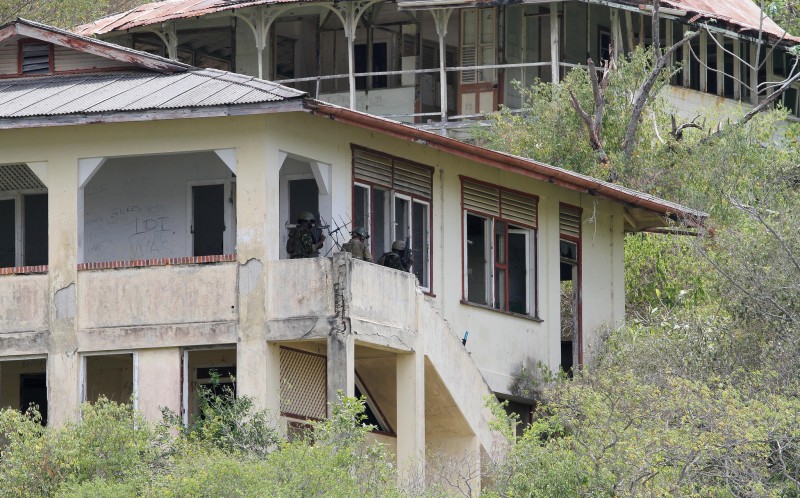
Members of the Trinidad and Tobago Defence Force conduct an exercise on Chacachacare Island in conjunction with U.S. forces. DoD photo by Army Capt. Daisy C. Bueno, courtesy the USASOC News Service's Flickr page. Used under a CC BY 2.0 license.
Nearly three years ago, Trinidad and Tobago's Prime Minister Kamla Persad-Bissessar declared a “limited” state of emergency, ostensibly in an effort to combat a surge in the crime rate. There was rampant debate at the time over whether this extreme step, which trampled upon civil rights — most notably those of young, poor, black males from disadvantaged communities — was an effective (or even legal) way to stem the tide of violence.
The state of emergency was lifted in December 2011, but the past few weeks have been a kind of déjà vu. After a soldier was shot dead in Laventille, an area widely regarded as a hotbed of gang warfare, the country's military, which complained of being under siege in these “hotspots”, launched a manhunt for the suspected killer. They have allegedly been going about their business without warrants or police assistance.
The acting commissioner of police has made his position clear: soldiers performing the duties of police officers is illegal and any military officers found to be flouting the law or physically abusing citizens will be arrested. But in a country where the citizenry's confidence in law enforcement is dwindling, many are questioning whether the prime minister's promise to “unleash the dogs of war” on criminals — essentially policing at any price — is helping to create a dangerous climate in which military dictatorships and police states can thrive.
Crime in Trinidad and Tobago has been on the increase over the past decade or more thanks to the rise of gun-toting gangs fueled by the illicit drug trade. Now, amidst allegations that the government has actually been sanctioning these criminal elements by putting them on the state's payroll, citizens are more skeptical than ever about crime and how it is being dealt with.
Wired868, one of the few local blogs keeping a constant eye on political issues, predicted even before the military raids came to light that “there is just one problem here; and it lies in the distribution of resources”:
In October 2013, National Security Minister Gary Griffth told the Trinidad Guardian that he had discovered ‘persons involved in criminal activity who had state contracts’ particularly in the Life Sport programme [an initiative of the country's Ministry of Sport, which was intended to give young people in disadvantaged communities access to sporting activities as an option to getting involved in crime]. If this is true, then there is a real possibility that the State is funding both sides of the ‘War’ it declared and this puts our Police Service in a very precarious situation […]
We must review the extent to which our development agenda fosters criminality, thus, making criminals not an anomaly but an inevitability […] accepting extra judicial killings in lieu of justice is not and cannot be the answer.
The post quoted statistics from the Trinidad and Tobago Police Service website to explain why crime management that happens outside the rule of law is counter-productive. The Caribbean country averages 25 extrajudicial killings per year for the last 15 years, but has already passed that number in 2014:
If in fact these extra judicial killings were removing those responsible for the scourge of crime shouldn’t a reduction in murders be a logical expectation? […] Those who represent the law cannot feign ignorance to its diktats. One cannot expect to ignore the law to engage those who ignore the law.
We have buckled to acceptance not because we condone killing but precisely the opposite—because we do not. This is the contradiction. That is the double standard…That is why it will not work.
A post written by Mr. Live Wire, one of Wired868's most prolific bloggers, addressed the behaviour of members of the country's armed forces, pointing out that the manhunt for Lance Corporal Kayode Thomas's killer allegedly went regional:
In Trinidad and Tobago, farce is wearing camouflage these days as soldiers have apparently taken control of Laventille in the search for the killer of Lance Corporal Kayode Thomas while also kicking in doors and kicking down residents as far as Toco without warrants or any legal authority.
On Wednesday, the Trinidad Guardian alleged that ‘men in camouflage worn by T&T military’ snatched Duane Skeete—whose brother is wanted for ‘questioning in relation to Thomas’ murder—in Grenada on Wednesday with the assistance of Grenadian soldiers. Relatives have not heard from Skeete since.
Surely a coordinated arrest on foreign soil could not have occurred without the blessing of Chief of Defence Staff, Major Kenrick Maharaj. Did National Security Minister Gary Griffith or Prime Minister Kamla Persad-Bissessar, the head of the National Security Council, approve this?
Was Skeete removed from Grenada in a military helicopter? Does Teteron [headquarters of the Trinidad and Tobago Regiment] have its own Guantanamo wing?
In short, Trinidad and Tobago appears to be under martial law.
The government has, thus far, not issued a definitive statement about the goings-on, but with the precedent set by 2011's state of emergency and the nation's security forces appearing to ignore proper procedure, many are wondering, in the words of a calypso by King Austin, “who's going to guard the guards”?







4 comments